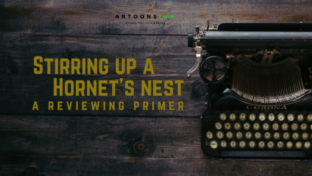Hola Artoons,
Here’s another set of helpful tips that, I hope, will come in handy as you go about reviewing.
To begin with, anonymous entries are a thing at ArtoonsInn where the writer chooses to be anonymous when submitting an entry until he/she chooses or remains anonymous for 3 days by default. Anonymity gives a chance for newer Artoons to share their reviews without the context of the writer’s past works.
Coming to the talk of the town, Reviewing, yes, it’s time to stir the hornet’s nest now.
Reviewing can be termed a cursed and condemned activity because reviewers have (or should have) a sick sensation of bad faith every time they strike the keyboard. If you are placing ‘great writing’ above ‘great story’ on your list of must-haves, you are already on the wrong path. I may sound rude. It IS rude but true.
I never recognize myself as a writer, I am a proud reader and never once did I pick up any book looking for some great language, grammar, or ‘message’. It’s always an interesting premise, be it Charles Dickens or Chetan Bhagat. Just because ‘great writing’ is not a priority, does it mean that writers need not focus on grammar, diction, and syntax?
No, absolutely not.
Any writer who aspires to pursue a path as a published author, should know the difference between amateur writing and seasoned writing. It’s revision. And what better place than ArtoonsInn for that?
Here are some things to keep in mind if you are serious about reviewing:
You are not a developmental editor
No reviewing involves revisions of writers’ expressions of their faiths or judgments. A developmental editor (akin to pre-emptive editing done by a teammate in ArttrA) might discuss this concern with the respective writer but commonly does not impose on the author’s convictions. If the author wanted to have a particular character arc, say, Adam from Mia Estoria Elpidas; his character arc is Guilt ridden-hopeless-distrust -cynical-hopeful-Guilt free. And each paragraph works towards this. If you question the arc, say you wanted the MC to not be guilt-free at the end (Maybe you feel that it’s hard to let go), then there is a fault in your analysis. A second read would help here.
You’re not a kingmaker
I am sorry for being harsh. Your ideas about how to construct prose may conflict with those of the writer who wrote it. It’s okay to point it out without sounding like it’s some sort of rule unless it’s an actual rule (grammar, syntax). However, having said that, writers need to understand that there is a strong correlation between a good writer and good grace.
Reviewers don’t have any personal gain from critiquing your work. Take reviews with a fistful of salt. Respect the time spent by the reviewer and move on.
Focus on the essentials
Thoughtful critiques can help the writer focus on essentials. Think about:
- What exactly is the writer’s purpose?
- What exactly is the conflict?
- Is there sufficient background for conflict and build up to its resolution?
- Does each scene advance the plot?
- Is there any inherent message the writer wants to convey?
- What’s the genre indexing (a boon by ArtoonsInn)?
- Is the story following the genre fundamentals?
It’s sad to see that many reviewers are not noticing the essentials and directly jumping onto the advanced shenanigans. Individual style is something you need to be careful about considering. But, that’s not to say that you avoid commenting on the language you feel is improper or over the top.
Rear-end your opinions.
Avoid starting your reviews with phrases like ‘This is a disaster’, ‘I am disappointed’ etc. Whether you’re writing a long, feature-style review or a short, one-paragraph review, remember this mantra: It’s only in the final two or three sentences of a short review that reviewers should offer opinions. This way, the reader has enough background to understand where the reviewer’s opinion is coming from.
Spend a minute thinking about the consequences.
Be sure that you consider the consequences of your opinions before you decide what to say or how to present your review. There is no point in hurting a budding writer or worse, making them doubt their own skills. If you get ‘God save this story’ feeling, there is always DM (Facebook) or anonymous comment(website). Make use of these. Or better, scroll past.
Find a strong angle for your reviews.
The only thing worse than a poorly written review is a pointless one. Ask questions to yourself.
Like,
- Is this writer catering to the gallery?
- Did you just read the best story of the event?
- Why does this writer do such a bad job at representing women?
The point is, build real arguments that will pull the writer to appreciate your review and maybe act on it. Any appreciation by fellow readers is the icing on the cake.
Phew. Six lengthy pointers!
Now, am I absolutely right about these things?
No, even I am a learner.
And does it mean that you need to do all these all the time?
No. It depends on the time you have for reviewing.
Negative criticism is an obligation of the nervous system, you can’t avoid it but you can try to tame it. It’s also a reason why it’s unfitting for reviewers to beat their breasts in pride over negativity. There’s no particular method to practice reviewing, no technique to prescribe, and no tone to recommend, any more than there is for writing. It’s a matter of sensibility—and of sensitivity.
All the best. Adios.








